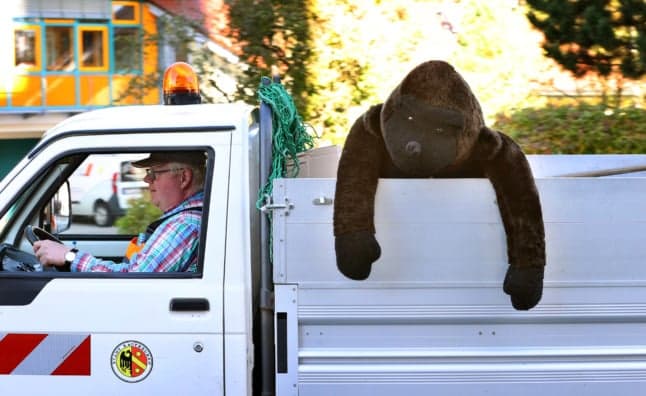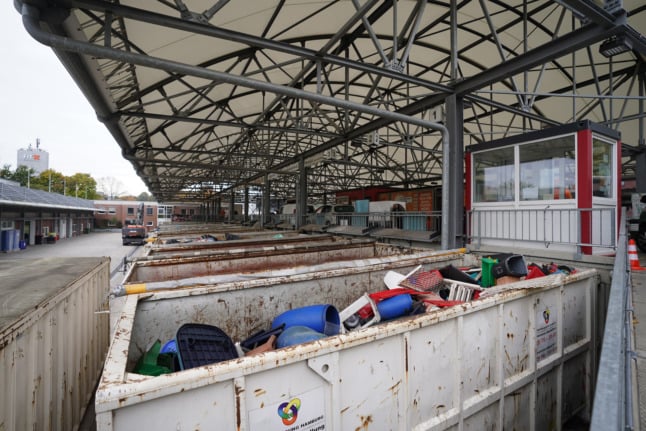Reader question: How do I dispose of unwanted furniture in Germany?

If your cellar is full of tattered sofas and decaying desks, you may be wondering how you can get rid of it while staying on top of German waste disposal laws. Here's what you need to know.
If you're moving house or hoping to have a spring clear-out, you may want to say goodbye to a few of your old belongings. When it comes to small items like clothes, electronics and books, it's not too hard to take them to a donation point like a Kleiderspende (clothes donation point), a second-hand shop or your local tip.
But what do you do with what's known as Sperrmüll - big household items like furniture, carpets and mattresses? Is it okay to drop on the street with a 'zu verschenken' (to give away) label and hope that one of your neighbours will claim it as their own, or are there specific rules governing how you get rid of it in a legal and environmentally-friendly way?
Here's what you need to know.
Leaving it on the street?
Though it may be fairly common to see old furniture on the streets in Germany - supposedly meant as a gift to the neighbourhood - this technically counts as fly-tipping and should be avoided.
Funnily enough, people don't often want a soggy, mud-stained mattress or weather-damaged table, so it may just end up staying there for months as clutter.
There are three alternative things you can do instead:
1. Sell your items
One easy way to get rid of your items is to list them on an online marketplace such as Facebook Marketplace or Ebay Kleinanzeigen. If you specify "collection only" (Nur abholung), you'll be saved the hassle of carrying your luggage all the way to the tip and you may even earn a few euros in the process.
The one risk of doing this is that it can be hard to find a buyer in your area who's willing to pick it up quickly. For this exact reason, people often offer second-hand furniture at a huge discount or even for free.
To maximise your changes of selling it, take a number of photos and include as much helpful info about your furniture as possible - and consider offering a bargain price.
If it doesn't sell within a week, you may want to lower the price once more. Post information about your item on as many "buying and selling" groups on Facebook as you can, as well as places like Ebay and Craigslist.

The Ebay Kleinanzeigen app. Photo: picture alliance/dpa | Christoph Dernbach
When deciding on a price, try and factor in the difficulty of picking it up. If it's a massive corner sofa, listing it for free may be your best bet, but if it's a table or chairs or IKEA furniture that can be dismantled, you may be able to ask a bit more for it.
Even if it ends up being given away, this still saves you the time and money you may have otherwise spent getting rid of it (see below) and gives you the satisfaction of knowing your furniture is starting a new life in another person's home.
READ ALSO: How to master second-hand shopping like a German
2. Have them collected
When it comes to having your old furniture collected, you'll generally have two options: the waste collection service organised by your city or municipality, or private waste disposal services.
Not too long ago, cities used to organise waste disposal days once or twice a year where residents could leave old furniture outside to be collected. This is sadly a thing of the past, though some local governments do still offer one or two free collections per year that you can book in advance.
To take advantage of these, you'll generally have to fill in an online form with your home address, desired pick-up date and details of the items you want collected. The pavement in front of your house will then serve as the collection point. If you're moving house and have a hard deadline for getting rid of the old furniture, try to do your research at least four weeks in advance to make sure you can get an appointment.
Different cities have different regulations about which items are taken away for collection. So before lugging that sofa downstairs to leave it on the street, it's best to find out in advance what applies to you.
In general, the definition of Sperrmüll (bulky waste) includes most of your large household items, from garden or balcony furniture to old beds, tables, sofas and chairs. It should be possible to carry and dispose of the items, so the individual parts usually shouldn't way more than 70kg or or be more than 2.5 metres long.
In some cases, you may also have to pay a subsidised rate for the service. This is the case in Berlin, where prices start at €50 if booked more than 16 days in advance. Check with your Stadtverwaltung (city administrators) for specific guidance.
The other option - booking a private waste disposal service - is likely to offer more flexibility but may cost slightly more. To find providers, google "Sperrmüll entsorgen" and the name of your city or town. A number of options are likely to pop up for you to chose from.
According to Deutsche Post, you should budget at least €35 per square metre of waste when booking a private service.
3. Recycle them
This is definitely the most time-consuming option, but it may be your only choice if you can't find a taker for your furniture and don't want to spend the money having it picked up.
Every reasonably sized town should have at least one Wertstoffhof or Recyclinghof that will accept large items such as old household furniture, bicycles, prams and so on. There will also be places to dispose of large appliances like fridges and ovens.
READ ALSO: EXPLAINED: The complete guide to recycling in Germany

A recycling station in Hamburg. Photo: picture alliance/dpa | Marcus Brandt
You can often find the location of your nearest recycling station on Google Maps or by looking on the website of your local government. If it's walkable or easy to reach on public transport, maybe you could enlist the help of friends or family to help you transport some of the heavier items there.
Otherwise, you can get there in a car or even hire a van to help you ditch a lot of old furniture in one go.
If you're moving house, you could also arrange to dispose of the furniture at the same time as the move. Check with your removal service to see if this is possible, or book a man/woman with a van by the hour and ask them to stop off at the recycling point on the way to your new address.
Useful vocabulary
Bulky waste - (der) Sperrmüll
Collection only- Nur abholung
To give away - zu verschenken
Furniture - (das) Möbel
Bulky household items - sperrige Haushaltsgegenstände
to dispose (of something)- (etwas) entsorgen
Recycling station - (der) Wertstoffhof / Recyclinghof
Comments
See Also
If you're moving house or hoping to have a spring clear-out, you may want to say goodbye to a few of your old belongings. When it comes to small items like clothes, electronics and books, it's not too hard to take them to a donation point like a Kleiderspende (clothes donation point), a second-hand shop or your local tip.
But what do you do with what's known as Sperrmüll - big household items like furniture, carpets and mattresses? Is it okay to drop on the street with a 'zu verschenken' (to give away) label and hope that one of your neighbours will claim it as their own, or are there specific rules governing how you get rid of it in a legal and environmentally-friendly way?
Here's what you need to know.
Leaving it on the street?
Though it may be fairly common to see old furniture on the streets in Germany - supposedly meant as a gift to the neighbourhood - this technically counts as fly-tipping and should be avoided.
Funnily enough, people don't often want a soggy, mud-stained mattress or weather-damaged table, so it may just end up staying there for months as clutter.
There are three alternative things you can do instead:
1. Sell your items
One easy way to get rid of your items is to list them on an online marketplace such as Facebook Marketplace or Ebay Kleinanzeigen. If you specify "collection only" (Nur abholung), you'll be saved the hassle of carrying your luggage all the way to the tip and you may even earn a few euros in the process.
The one risk of doing this is that it can be hard to find a buyer in your area who's willing to pick it up quickly. For this exact reason, people often offer second-hand furniture at a huge discount or even for free.
To maximise your changes of selling it, take a number of photos and include as much helpful info about your furniture as possible - and consider offering a bargain price.
If it doesn't sell within a week, you may want to lower the price once more. Post information about your item on as many "buying and selling" groups on Facebook as you can, as well as places like Ebay and Craigslist.

When deciding on a price, try and factor in the difficulty of picking it up. If it's a massive corner sofa, listing it for free may be your best bet, but if it's a table or chairs or IKEA furniture that can be dismantled, you may be able to ask a bit more for it.
Even if it ends up being given away, this still saves you the time and money you may have otherwise spent getting rid of it (see below) and gives you the satisfaction of knowing your furniture is starting a new life in another person's home.
READ ALSO: How to master second-hand shopping like a German
2. Have them collected
When it comes to having your old furniture collected, you'll generally have two options: the waste collection service organised by your city or municipality, or private waste disposal services.
Not too long ago, cities used to organise waste disposal days once or twice a year where residents could leave old furniture outside to be collected. This is sadly a thing of the past, though some local governments do still offer one or two free collections per year that you can book in advance.
To take advantage of these, you'll generally have to fill in an online form with your home address, desired pick-up date and details of the items you want collected. The pavement in front of your house will then serve as the collection point. If you're moving house and have a hard deadline for getting rid of the old furniture, try to do your research at least four weeks in advance to make sure you can get an appointment.
Different cities have different regulations about which items are taken away for collection. So before lugging that sofa downstairs to leave it on the street, it's best to find out in advance what applies to you.
In general, the definition of Sperrmüll (bulky waste) includes most of your large household items, from garden or balcony furniture to old beds, tables, sofas and chairs. It should be possible to carry and dispose of the items, so the individual parts usually shouldn't way more than 70kg or or be more than 2.5 metres long.
In some cases, you may also have to pay a subsidised rate for the service. This is the case in Berlin, where prices start at €50 if booked more than 16 days in advance. Check with your Stadtverwaltung (city administrators) for specific guidance.
The other option - booking a private waste disposal service - is likely to offer more flexibility but may cost slightly more. To find providers, google "Sperrmüll entsorgen" and the name of your city or town. A number of options are likely to pop up for you to chose from.
According to Deutsche Post, you should budget at least €35 per square metre of waste when booking a private service.
3. Recycle them
This is definitely the most time-consuming option, but it may be your only choice if you can't find a taker for your furniture and don't want to spend the money having it picked up.
Every reasonably sized town should have at least one Wertstoffhof or Recyclinghof that will accept large items such as old household furniture, bicycles, prams and so on. There will also be places to dispose of large appliances like fridges and ovens.
READ ALSO: EXPLAINED: The complete guide to recycling in Germany

You can often find the location of your nearest recycling station on Google Maps or by looking on the website of your local government. If it's walkable or easy to reach on public transport, maybe you could enlist the help of friends or family to help you transport some of the heavier items there.
Otherwise, you can get there in a car or even hire a van to help you ditch a lot of old furniture in one go.
If you're moving house, you could also arrange to dispose of the furniture at the same time as the move. Check with your removal service to see if this is possible, or book a man/woman with a van by the hour and ask them to stop off at the recycling point on the way to your new address.
Useful vocabulary
Bulky waste - (der) Sperrmüll
Collection only- Nur abholung
To give away - zu verschenken
Furniture - (das) Möbel
Bulky household items - sperrige Haushaltsgegenstände
to dispose (of something)- (etwas) entsorgen
Recycling station - (der) Wertstoffhof / Recyclinghof
Join the conversation in our comments section below. Share your own views and experience and if you have a question or suggestion for our journalists then email us at [email protected].
Please keep comments civil, constructive and on topic – and make sure to read our terms of use before getting involved.
Please log in here to leave a comment.